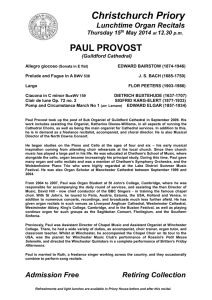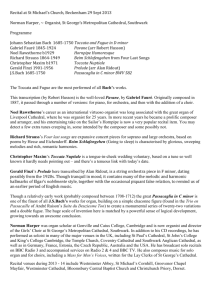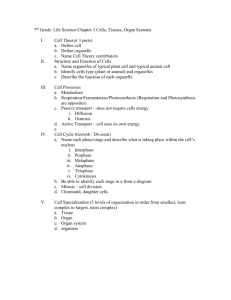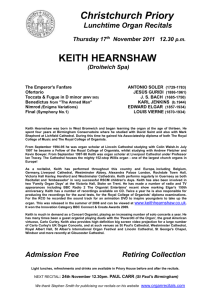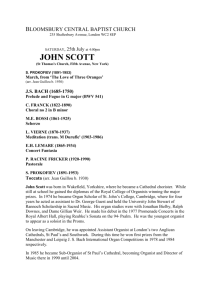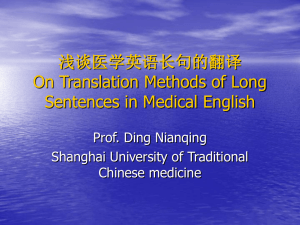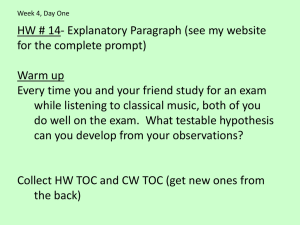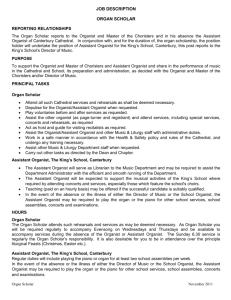Janette Fishell: Compilation of press notices (originals provided
advertisement
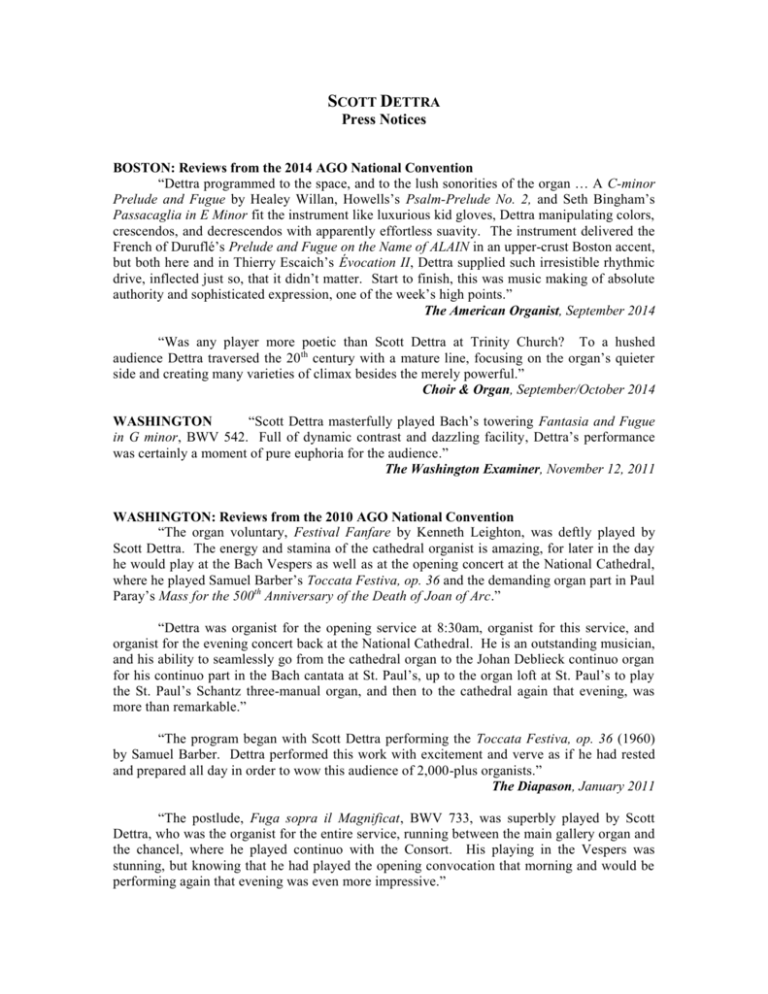
SCOTT DETTRA Press Notices BOSTON: Reviews from the 2014 AGO National Convention “Dettra programmed to the space, and to the lush sonorities of the organ … A C-minor Prelude and Fugue by Healey Willan, Howells’s Psalm-Prelude No. 2, and Seth Bingham’s Passacaglia in E Minor fit the instrument like luxurious kid gloves, Dettra manipulating colors, crescendos, and decrescendos with apparently effortless suavity. The instrument delivered the French of Duruflé’s Prelude and Fugue on the Name of ALAIN in an upper-crust Boston accent, but both here and in Thierry Escaich’s Évocation II, Dettra supplied such irresistible rhythmic drive, inflected just so, that it didn’t matter. Start to finish, this was music making of absolute authority and sophisticated expression, one of the week’s high points.” The American Organist, September 2014 “Was any player more poetic than Scott Dettra at Trinity Church? To a hushed audience Dettra traversed the 20 th century with a mature line, focusing on the organ’s quieter side and creating many varieties of climax besides the merely powerful.” Choir & Organ, September/October 2014 WASHINGTON “Scott Dettra masterfully played Bach’s towering Fantasia and Fugue in G minor, BWV 542. Full of dynamic contrast and dazzling facility, Dettra’s performance was certainly a moment of pure euphoria for the audience.” The Washington Examiner, November 12, 2011 WASHINGTON: Reviews from the 2010 AGO National Convention “The organ voluntary, Festival Fanfare by Kenneth Leighton, was deftly played by Scott Dettra. The energy and stamina of the cathedral organist is amazing, for later in the day he would play at the Bach Vespers as well as at the opening concert at the National Cathedral, where he played Samuel Barber’s Toccata Festiva, op. 36 and the demanding organ part in Paul Paray’s Mass for the 500th Anniversary of the Death of Joan of Arc.” “Dettra was organist for the opening service at 8:30am, organist for this service, and organist for the evening concert back at the National Cathedral. He is an outstanding musician, and his ability to seamlessly go from the cathedral organ to the Johan Deblieck continuo organ for his continuo part in the Bach cantata at St. Paul’s, up to the organ loft at St. Paul’s to play the St. Paul’s Schantz three-manual organ, and then to the cathedral again that evening, was more than remarkable.” “The program began with Scott Dettra performing the Toccata Festiva, op. 36 (1960) by Samuel Barber. Dettra performed this work with excitement and verve as if he had rested and prepared all day in order to wow this audience of 2,000-plus organists.” The Diapason, January 2011 “The postlude, Fuga sopra il Magnificat, BWV 733, was superbly played by Scott Dettra, who was the organist for the entire service, running between the main gallery organ and the chancel, where he played continuo with the Consort. His playing in the Vespers was stunning, but knowing that he had played the opening convocation that morning and would be performing again that evening was even more impressive.” Scott Dettra Press Notices, page 2 “The fiery Toccata Festiva by Samuel Barber is essentially a single-movement organ concerto lasting about 15 minutes. Tying the work to the National Cathedral, it is interesting to note that the organ soloist at the work’s 1960 premiere with the Philadelphia Orchestra was Paul Calloway, then organist of the cathedral. The performance of the works at this year’s convention featured current cathedral organist Scott Dettra, who was fully up to the challenge … Another noteworthy feature is the technically demanding pedal cadenza, ably handled by Mr. Dettra. The distance between the conductor and orchestra and the organ console seemed to present no obstacle to a finely coordinated performance.” The American Organist, October 2010 NEW YORK “Scott Dettra played the organ with flag-waving panache.” The Washington Post, June 1, 2003 PHILADELPHIA: Reviews from the 2002 AGO National Convention “Scott Dettra’s service playing was a model of inventive, uplifting support.” The American Organist, October 2002 DUBLIN, IRELAND: Review from the 1996 Dublin International Organ Compeition “Dettra played the Bach with a greater lightness and clarity than the others, imparting a rhythmic spring to the notes … The best Widor playing at Christ Church Cathedral on Saturday night came from Dettra, who played two movements from the Symphony No. 6 with compelling intensity.” The Irish Times, June 25, 1996 RECORDINGS Tongues of Fire (West Point Cadet Chapel organ) “It is clear from the very first few tracks of this CD that Scott Dettra knows how to make this organ sing, even when put to the extreme test of the German baroque and French Classic literature. He appears to handle this gigantic instrument with ease and great confidence, and with solid technique and youthful vigor to boot … His registrations in DeGrigny’s Veni Creator are craftily chosen, and for this reviewer, capture the old-world grandeur of this music. I would never have thought that this organ could produce something this close to French Classic sound … The overall program shows him to be a talented technician as well as interpreter of a wide scope of the literature … Highly recommended.” The Diapason, March 2000 “Organist Scott Dettra has fashioned an interesting and cohesive program. He puts the Hymn d’Orgue: “Veni Creator” by Nicholas de Grigny near the beginning of his recital and chooses to end with Duruflé’s mighty Prelude, Adagio, and Choral Variations on the theme “Veni Creator”. Since both works use the plainsong hymn, the listener gets a sense of completion on hearing the final movement of the more modern work. To make the tie even stronger, Dettra has the original chants sung by the men’s voices of Fuma Sacra between the variations of both pieces, a good idea that really works. In between the two “Veni Creator” compositions, he presents another major Duruflé work, as well as colorful compositions by Honegger and Vierne. The complex fugue in Duruflé’s homage to the memory of composer Jehan Alain, who was killed in World War II, is played with finesse and flair, and the recording is absolutely clean and clear. This is a very fine recording of singular repertoire.” ClassicsToday.com Karen McFarlane Artists, Inc. 33563 Seneca Drive • Cleveland, OH 44139 TOLL FREE (866) 721-9095 • FAX (440) 542-1890 • www.concertorganists.com
